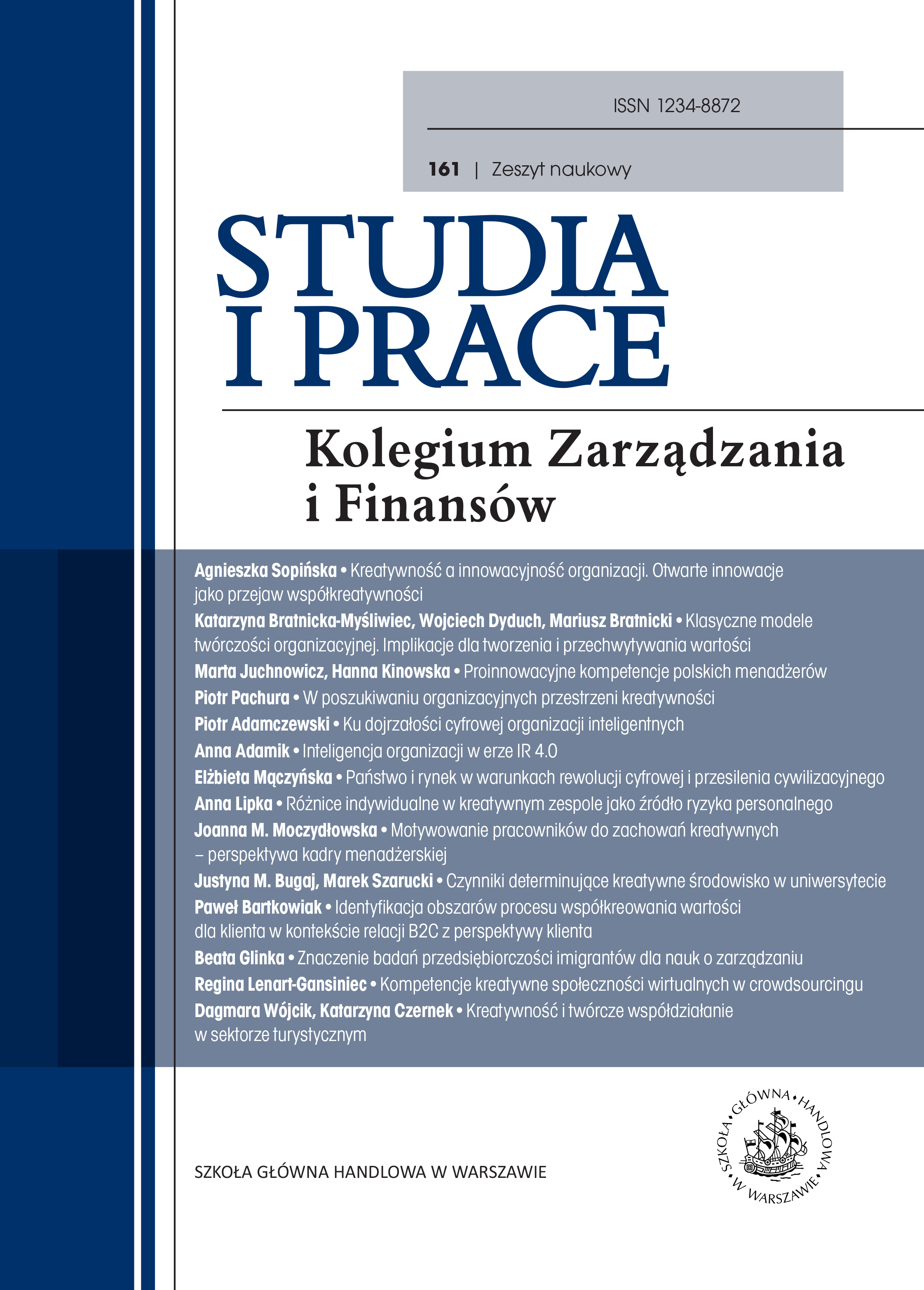Motivating Workers to Behave Creatively. Managerial Staff Perspective
DOI:
https://doi.org/10.33119/SIP.2018.161.9Keywords:
creativeness, motivating, managersAbstract
The aim of the article is to identify actions undertaken by Polish managerial staff to stimulate the creative behaviour of employees. The article consists of a theoretical as well as empirical part including the results of survey conducted among 60 representatives of managerial staff. The research results indicate that, to a large extent, employees are not encouraged to show their creative potential by financial tools, or these tools are used within a very limited scope. In the managers’ approach to motivation there is a blurred difference in meaning between motivating to do and providing conditions for doing. Most of them are convinced that the emanation of creativity is a natural, inner need of employees. Thus, the
role of the organisation is confined to the provision of conditions in favour of creative activities. At the same time, the respondents in most cases assessed the motivating attempts to make a better use of creative potential as not really effective or non-existent in their workplace environment. The examined managers are aware of the value of employees’ creativity for the organisation, but a considerable part of them do not feel personally responsible for encouraging subordinates to behave creatively.
Downloads
References
2. Bajer M., Leenders R. T., Oldham G. R., Vadera A. K., Win or Lose the Battle for Creativity:
The Power and Perils of Intergroup Competition, „Academy of Management Journal” 2010,
vol. 3, no. 4.
3. Bissola R., Imperatori B., Organizing Individual and Collective Creativity: Flying in the Face of
Creativity, „Creative Industries Journal” 2011, vol. 20, no. 2.
4. Collins M., Creativity and the Organization, „IMPO” 2012, November/December.
5. Czerw A., Jak stymulować kreatywność w organizacji?, http://www.competitiveskills.pl
6. Frese M., Fayad D., Personal Initiative: An Active Performance Concept for Work in the 21 st.
Century, „Research in Organizational Behavior” 2001, vol. 23.
7. Girdauskiene L., The Key Factors for Creativity Implementation and Knowledge Creation in an
Organization: The Structural Approach, „Economics and Management” 2013, vol. 18, no. 1.
8. Karpacz J., Kreatywność przedsiębiorców jako determinanta poszukiwania szans, „Przegląd
Organizacji” 2011, nr 1.
9. Lumpkin G. T., Lichtenstein B. B., The Role of Organizational Learning in the Opportunity
– Recognition Process, „Entrepreneurship. Theory & Practice” 2005, vol. 60, no. 3.
10. Marjolein C. J., de Stobbeleir K., de Clippeleer I., The Antecedents of Creativity Revisited: A Process
Perspective, „Creative Industries Journal” 2014, vol. 23, no. 2.
11. Moczydłowska J. M., Zarządzanie kompetencjami zawodowymi a motywowanie pracowników,
Wydawnictwo Difin, Warszawa 2008.
12. Moczydłowska J. M., Motivating Employees to Creative Behaviours in the Practice of Polish Small
and Medium Enterprises, w: Human Potential Management in a Company. Communication,
red. S. Borkowski, R. Bobàk, Tomas Bata University in Zlin, Zlin 2011.
13. Moczydłowska J. M., Professional Psychological Challenges in the Perception of Managers,
w: Toyotarity. Human Resources Management, red. S. Borkowski, J. Rosak-Szyrocka, Publisher
University of Maribor, Celje 2012.
14. Radwiłowicz R., Zaproszenie do samowiedzy, czyli o teorii treści i form samoświadomości,
Kwartalnik Naukowy „Prometeusz” 2005, nr 4.
15. Richtnér A., Löfsten H., Managing in Turbulence: How the Capacity for Resilience Influences
Creativity, „R&D Management” 2014, vol. 44, no. 2.
16. Rodhause S., Defining the Creative Industries, „Creative Industries Journal” 2009, vol. 1.
17. Romanowska M., Kształtowanie wartości firmy w oparciu o kapitał intelektualny, w: Systemy
informacji strategicznej. Wywiad gospodarczy a konkurencyjność przedsiębiorstwa, red. R. Borowiecki,
M. Romanowska, Difin, Warszawa 2001.
18. Siedel S., Toward a Theory of Managing Creativity-intensive Processes: a Creative Industries
Study, „Information System and e-Business Management” 2011, vol. 9.
19. Skrzypek E., Kreatywność a zarządzanie wiedzą, „Zeszyty Naukowe Małopolskiej Wyższej
Szkoły Ekonomicznej w Tarnowie” 2014, t. 24, nr 1.
20. Szczepańska-Woszczyna K., Kompetencje menedżerskie w obszarze kreatywności i innowacyjności,
„Zeszyty Naukowe Wyższej Szkoły Humanitas. Zarządzanie” 2014, nr 1.
21. Wojtczuk-Turek A., Rozwijanie kompetencji twórczych, Oficyna Wydawnicza SGH w Warszawie,
Warszawa 2010.
22. Woodman R. W., Sawyer J. E., Griffin R. W.: Toward a theory of organizational creativity, „Academy
of Management Review” 1993, vol. 18 (2).
23. Zdonek I., Zdonek D., Analiza procesu twórczego i zawodów kreatywnych w Polsce, „Zeszyty
Naukowe Politechniki Śląskiej. Organizacja i Zarządzanie” 2015, zeszyt 80, nr 1933.









